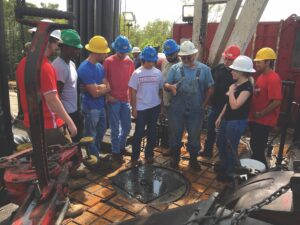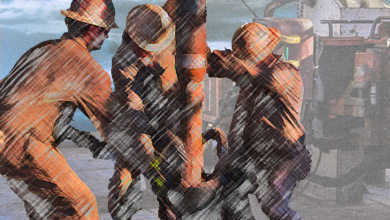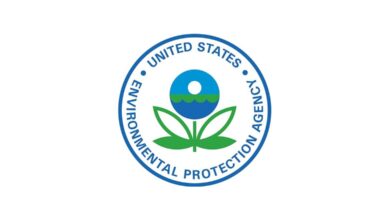Amid global pandemic, IADC leverages digital platforms to deliver member services and continue industry representation worldwide
By Angie Gunden, IADC Senior Director – Corporate Services and Marketing
Government and Industry Affairs
The goal of IADC’s Government and Industry Affairs (GIA) team is to proactively engage with US and global regulatory and legislative bodies, policy makers and oil and gas producers to advocate for positive policy outcomes on behalf of the drilling industry. As part of our pursuit of transparent and appropriate regulations and standards, IADC serves as an educative resource on policies and provides input on standards making.
“The COVID-19 pandemic caused a shift in our plans for 2020, like it did for everyone,” said Elizabeth Craddock, IADC Vice President, Government and Industry Affairs. “But the team maintained a steady focus on preserving a strong presence in Washington, DC. We have continued to keep an eye on policies and issues that are important to our members.”
For instance, the Paycheck Protection Program (PPP) included in the Coronavirus Aid, Relief and Economic Security (CARES) Act required particularly close attention. IADC’s GIA team followed the development of the PPP, communicated potential impact to members and helped them navigate the program.

In addition, the global pandemic required new protocols for members related to various aspects of day-to-day operations, including rig crew travel. The GIA team participated in a plethora of virtual meetings and working groups to help ensure a fluid transition to the new protocols and procedures, enabling operations to continue in a safe manner for all personnel.
For example, IADC weighed in via a joint letter with API that was sent to US Secretary of State Mike Pompeo in response to the Level 4 Travel Advisory regarding US travel restrictions. The letter stressed the importance of being able to make crew changes internationally with US personnel. A second joint trade associations letter was sent to state governors regarding classification of oilfield service workers as essential personnel.
Engagements with partner organizations on issues unrelated to COVID-19 also continued. Pre-pandemic, the GIA team attended the Offshore Operators Committee annual meeting, the Center for Offshore Safety coordination sessions, an International Marine Contractors Association (IMCA) meeting, the API Winter Standards conference, and the BSEE and Offshore Operators Committee standards workshop, and many more. In an enormous showing of support, IADC and 62 energy industry trade groups, councils and associations collaborated on a joint letter to support Mark Menezes’ nomination to serve as US Deputy Secretary of the Department of Energy.

Efforts to expand IADC’S political action committee also progressed in 2020. As of late September, the DRILLERSPAC had raised more than $43,000 from 70-plus contributors. Plans were to support 25 bi-cameral and bi-partisan candidates from 10 states in this year’s elections.
Further, in recognition of IADC’s 80th anniversary this year, the GIA team worked with state legislatures in Louisiana and Oklahoma to receive resolutions congratulating IADC on its anniversary and to have members of Congress offer statements for the Congressional Record in support of the association.
“2020 has definitely thrown us many curve balls, but I’m proud of what our team has been able to accomplish on behalf of our members and the drilling industry,” Ms Craddock said.
International Development
In 1971, the name of the association changed from the American Association of Oilwell Drilling Contractors to the International Association of Drilling Contractors. Since that time, IADC has steadily strengthened its global impact. The International Development team, led by Vice President Mike DuBose, comprises a network of regional representatives in Europe, the UK, Brazil, the Middle East, Asia Pacific, Australasia and, the latest addition, Latin America.
These regional representatives serve as local advocates, working closely with IADC chapters and cultivating relationships with local government officials, regulators and other industry organizations.
“Having boots on the ground in key operational regions around the globe proved more important than ever in 2020,” Mr DuBose said. “Our primary purpose is to represent IADC and drilling contractor interests around the globe. Trying to understand regionalized impacts of the pandemic would have been quite challenging if we didn’t have an established network.”
One of the most critical issues that emerged in 2020 was equipment and crew movement in the midst of the global pandemic. IADC regional representatives navigated this issue by engaging with local authorities in Macaé, Brazil, and with the Secretary of Petroleum and Natural Gas in India to ensure continued movement to and from offshore rigs. IADC participated in joint industry efforts with the Australian Petroleum Production and Exploration Association and National Offshore Petroleum Safety and Environmental Management Authority in Australia to allow entry into the country for rotating crews. In the UK, IADC served as an industry representative on the Oil and Gas Pandemic Steering Group to encourage continued crew movements. IADC’s International Development team also facilitated the development of an International Maritime Organization (IMO) circular letter regarding movement of offshore personnel.

COVID-19 related support was also provided in the form of virtual member meetings and weekly status calls with industry trade associations – the International Association of Oil and Gas Producers (IOGP), IMCA, International Association of Geophysical Contractors (IAGC), and International Support-Vessel Owners Association.
Prior to the pandemic, IADC’s International Development team was already attending IMO meetings, engaging with IOGP Environmental, Safety, Aviation and Communication staff liaisons, participating in IAGC’s annual meeting and working with the Netherland’s Oil and Gas Exploration and Production Association to argue the industry’s case against that country’s new nitrogen emissions policy.
Despite the circumstances of 2020, IADC’s chapters around the world also remained active:
- The Southern Arabian Peninsula chapter, along with the International Onshore Advisory Panel, supported the Contracts Committee with a Contract Seminar in Dubai;
- The Southeast Asia Chapter held three virtual chapter meetings to discuss the impacts of COVID-19, mitigating measures, protocols and processes;
- The South Central Asia Chapter reengaged on the India Ministry of Shipping’s renewed interest in extending cabotage provisions to non-self-propelled MODUs and supported the establishment of an IADC student chapter at Pandit Deendayal Petroleum University in Gandhinagar, India.
- The North Sea Chapter plans to hold its annual Safety Awards program virtually later this year.
IADC’s global reach also was expanded in 2020 with the formation of a new Latin America chapter. The chapter is based in Mexico and includes Central America, the Caribbean Islands and continental South America, with the exception of Brazil, which is served by an existing chapter in that country.
“2020 presented challenges that no one could have predicted,” Mr DuBose said. “The network of regional representatives proved to be absolutely critical in our ability to support members as they navigated local issues during an unprecedented situation. We are very fortunate to have such highly experienced regional representatives, as they were instrumental in quickly coming to the aid of our members.”
Accreditation and Credentialing
IADC’s Accreditation and Credentialing (ACD) group focuses on helping companies with efforts to ensure quality and consistency in training content and delivery while conforming to relevant industry standards. The ultimate goal of these activities is to prepare drilling industry personnel to perform their jobs safely and efficiently.
For the 14th year in a row, the ACD team passed the ISO 9001:2015 recertification audit with zero findings. The standard is based on quality management principles, including a strong customer focus, the motivation and implication of top management, the process approach and continual improvement. Additionally, the ACD group was recognized by the Association for Talent Development for both the WellSharp and the Knowledge Retention and Education for our Workforce (KREW) programs.
“I’m extremely proud of the team’s efforts, especially in such a challenging year,” said Brooke Polk, Senior Director – Accreditation Operations. “What we were able to accomplish this year for our members truly required collaboration among the ACD team and with members and other key partners.”
The ACD team started the year focused on several key initiatives, one of which was the continued development of the KREW system. The aim is to address known knowledge decay that occurs during the standard two-year recertification gap. A pilot was carried out with 75 users from eight companies on the KREW Steering Panel. The WellSharp and KREW panels also began development of a defined training path for workers during the two-year certification, which will be available in addition to the individualized learning opportunities to be recommended based on specific knowledge gaps. KREW is expected to launch early 2021.
Ongoing refinement of the WellSharp accreditation program progressed as well, including a review of the Drilling and Supervisor level drilling courses, and the formation of a combined MPD/Well Control workgroup to create WellSharp Driller and Supervisor level courses that incorporate underbalanced well control. The Returns Management Drilling workgroup was also formed to develop well control scenario guidance for simulations.
As work on KREW and WellSharp continued, the pandemic hit and created an unexpected need for virtual learning systems, so that well control training could continue amid social distancing guidelines, stay-at-home orders and travel restrictions. With collaboration between the ACD team and the WellSharp Advisory Panel and by leveraging the existing KREW system, WellSharp Live was created. Over the past four months, KREW has been delivered through more than 465 courses and to more than 2,600 individuals.
A process was also quickly put in place to allow accredited providers to deliver RigPass, DIT and Gateway courses remotely.
Another ACD effort this year has been its collaboration with Basin United, an industry-led group of onshore upstream stakeholder companies committed to improving safety performance in the Permian Basin. Companies such as Chevron, XTO, Shell, ConocoPhillips and Halliburton and industry groups like AESC and IADC are all supporters and participants. This year, ACD worked with Basin United to design, develop and implement the Basin United Fundamental Safety Orientation and Supervisor Leadership courses.
Basin United then selected IADC to be the accrediting body for these courses and to administer the program and courses through its accreditation database. A workgroup consisting of IADC HSE Committee members and Basin United participants is working to align Basin United’s Fundamental Safety Orientation with IADC’s RigPass program. The goal is to allow for one orientation to be delivered through IADC’s RigPass program that meets Basin United requirements.
Well Control
Well Control has been at the forefront of IADC activities for decades, and this year was no different. In addition to the forums for collaboration provided by the IADC Well Control Committee and related conferences, a myriad efforts were undertaken through several industry groups and accreditation programs, as discussed below.
- A workgroup of industry volunteers, in conjunction with the RAPID S-53 group, is working to develop an online Subsea Technician Competency Accreditation Program. To date, the group has completed the design of the database and the development of test questions for subsea technicians and senior subsea technician online exams. A pilot of the exams is expected by the end of this year, and the program is expected to be available early 2021.
- Returns Management Drilling (Now Conventional and Unconventional Well Control), initiated by the WellSharp Advisory Panel, aims to address gaps in the current WellSharp curriculum and focus on differences from fundamental well control utilizing dynamic risk assessment. The workgroup consists of participants from the WellSharp Advisory Panel and the IADC Underbalanced Operations and Managed Pressure Drilling Committee.
- The Returns Managed Drilling / Conventional and Unconventional Simulation Review workgroup was formed to identify simulator gaps, enhance simulator capabilities and identify simulation requirements with respect to well control training. The group is developing a list of recommendations for simulator companies. Once the list is finalized, simulator companies will be given an opportunity to present their plan to address identified gaps.
- The IOGP/IADC BOP Reliability Joint Industry Project (JIP), known as RAPID S-53, is an effort designed to collect data on BOP performance as specified by API Standard 53. Currently, the JIP members include 12 operators, 12 drilling contractors, three OEMs and two recently added component manufacturers.
Student Chapters
IADC’s Student Chapter program expanded early in the year with the addition of the University of North Dakota and Lone Star College. The 10th chapter was added this fall at Pandit Deendayal Petroleum University (PDPU) in India.
Student chapter activities continued despite the pandemic. In May, the Maharashtra Institute of Technology (MIT) Student Chapter in Pune, India, hosted a webinar, “Post-Pandemic Challenges and the Road Ahead for the Oil and Gas Industry and Future Generation of Petroleum Engineers.”
Students from Texas A&M and the University of Louisiana Lafayette (ULL) chapters participated in an IADC workgroup to update the Standard Format Equipment List for Semisubmersible/Drillship Units.
In September, ULL petroleum engineering students participated in a rig visit, giving them an opportunity to see the various components of a working rig after learning about them in a classroom.
According to Mr DuBose, who spearheads the IADC Student Chapter Program, participation in IADC conferences is another key component for students. “We know these students are receiving top-notch educations. Our goal is to expose them to the practical side of the business through conferences, rig tours and other industry events.”
Pre-pandemic, IADC had arranged for 25 students to attend conferences in Abu Dhabi, Bangkok and Africa. Additionally, a small group of students from Bossier Parish Community College attended a rig christening event held by an IADC member company. Early this fall, 75 students from six universities attended IADC virtual conferences.
Committees
IADC Committees forged ahead with a multitude of events and activities during this challenging year. Highlights include:
- Advanced Rig Technology: held workgroup meetings to draft the IADC Rig Sensor Stewardship Guidelines, which is expected to be released for public comment in Q4. The committee is also beginning a significant project to update the long-used IADC dull bit grading system into something more sophisticated and less subjective.
- Contracts: held two seminars; updated the Standard Format Equipment List for Semisubmersible/Drillship Units.
- Drilling Engineers: hosted two tech forums, “Rig for the Future” and “Transformational Leadership.” A third event will be held in November, “Remote Operations Centers and Future Potential.”
- Supply Chain: formed Benchmarking Subcommittee with mission of enabling sharing and discussion of supply chain best practices among contractors.
- Health, Safety and Environment: held biweekly contractor meetings to discuss what companies are doing to manage COVID-19 concerns on rig locations.
- Workforce Development: surveyed members and determined its focus areas to be developing and recruiting in a downturn for the upturn; using social media to market to the industry; and virtual training. The committee is also working on organizing a one-day workshop to share best practices for virtual instruction.
- Underbalanced Operations & Managed Pressure Drilling: The API 16RCD Subcommittee continued work on API 16RCD, 3rd Edition Specification Document and will soon begin the ballot process. The MPD Subcommittee is also ready to begin the ballot process for the Influx Management Annex to API 92S and 92M specification documents. The HSE/Training Subcommittee completed the curriculum for the IADC-accredited MPD Operations training course.
Communications
The pandemic has not stopped IADC from bringing news and information to our members and readers through a variety of platforms this year. DC’s print magazine readership remains at more than 30,000 people, on top of additional reach via the DrillingContractor.org news website; 12 issues of eNews; and a newly enhanced DC Digital Reader, which incorporates exclusive articles and audio/video interviews.
Throughout this year, IADC’s Communications team continued in-depth reporting on new technologies being developed and launched in the field to improve drilling and rig efficiency. Examples of these reports are:
- New energy storage and hybrid power systems for better fuel efficiency and lower carbon emissions;
- Field results from the large-scale deployment of a closed-loop drilling optimization system;
- Better shear rams and control systems for subsea BOPs; and
- An at-bit steerable system that drills single-trip vertical sections.
Beyond technology reports, DC articles have also examined new COVID-related challenges:
- How drilling contractors are relying on risk management and enhanced communication protocols to address supply chain risks and ensure operational integrity across their rig fleets;
- How logistical challenges for rig crew transfers are being handled; and
- How companies continue to ensure crew health and proper incident response readiness amid a global pandemic.
Another important communications offering is the virtual panel discussion (VPD). While VPDs are not new to IADC – the first one dates back to 2013 – this year they were moved to the Zoom video platform and became live events. Topics covered were:
- HSE Performance during the Corona Crisis: What Did We Learn?
- US Land: Lessons Learned from the Current Pandemic
- Driving Efficiency Through Industry Collaboration on Automation, Data Collection
- Congressional Insights on Energy and Climate Policy Preceding 2020 Election, featuring Congressman Garret Graves (R-LA).
The next VPD is planned for December: “Improving Fuel Efficiency and Meeting ESG Goals in Land Drilling Operations.” All archived VPDs are available on DrillingContractor.org for on-demand viewing.
Also in 2020, the IADC website was relaunched with a new design. In addition to back-end framework improvements and cybersecurity system enhancements, the site was redesigned to improve the overall user experience by incorporating the latest website design trends.
Drill Bits, IADC’s monthly e-newsletter reaching nearly 20,000 readers, is IADC’s primary vehicle for communicating pending legislation and regulation that may impact the industry, IADC initiatives, committee and chapter activity, new members, newly accredited training providers and upcoming conferences. This year, Drill Bits was completely redesigned to deliver content in a more visually appealing manner. Additionally, back-end improvements have enhanced search capability and now allow readers to view information topically. DC




